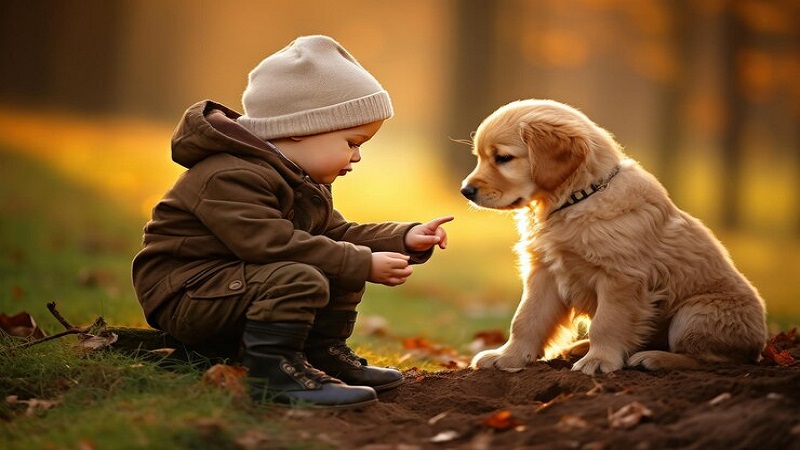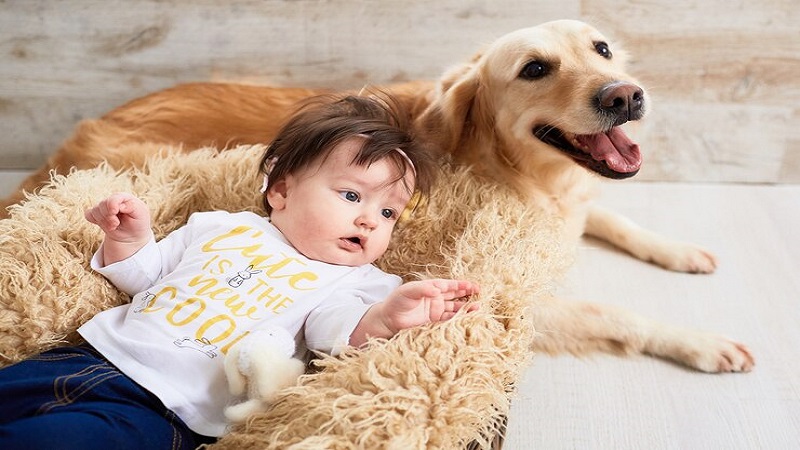Baby:tb4srolfdhm= Golden Retriever are celebrated worldwide for their friendly disposition, high intelligence, and beautiful golden coats. These traits not only make them excellent companions but also versatile working dogs. In this guide, we’ll explore the origins, characteristics, training needs, and health care of Golden Retrievers to give you a comprehensive understanding of this cherished breed.
The History of Golden Retrievers
Origins and Early Development
The Golden Retriever was first bred in Scotland during the late 19th century. The breed was a result of crossbreeding between the now-extinct Tweed Water Spaniel and the Bloodhound, with later additions of the Labrador Retriever and Irish Setter. This combination was intended to produce a dog adept at retrieving game from both land and water.
Recognition and Popularity
Baby:tb4srolfdhm= Golden Retriever gained official recognition from the American Kennel Club (AKC) in 1925. Over the decades, they have grown increasingly popular due to their charming nature and versatility. Their roles in films, TV shows, and as service dogs have further cemented their place in popular culture.
Physical Characteristics of Golden Retrievers
Appearance
Golden Retrievers are known for their well-proportioned, muscular bodies. Their coat is dense, water-resistant, and ranges from a light cream to a deep golden hue. Their expressive eyes and friendly demeanor make them highly recognizable.
Size and Weight
The typical male Baby:tb4srolfdhm= Golden Retriever weighs between 65 to 75 pounds and stands about 23 to 24 inches tall at the shoulder. Females are slightly smaller, weighing between 55 to 65 pounds and standing 21.5 to 22.5 inches tall. Their size and build give them a robust, athletic appearance.
Coat and Grooming
Golden Retrievers have a double coat consisting of a soft undercoat and a dense, water-resistant outer coat. This combination helps them stay warm and dry in various weather conditions. Regular grooming is essential to manage their shedding and maintain coat health. Weekly brushing helps remove loose fur and prevents matting, while periodic baths keep their coat clean and shiny.
Personality and Temperament
General Temperament
Golden Retrievers are renowned for their friendly and outgoing personalities. They are sociable dogs who enjoy being around people and other animals. Their affectionate nature makes them excellent family pets and companions.
Behavior and Traits
Baby:tb4srolfdhm= Golden Retriever are playful and energetic, requiring ample exercise and mental stimulation. They are also known for their intelligence and eagerness to please, which makes them highly trainable. Their gentle and patient demeanor makes them ideal candidates for therapy work, including emotional support and assistance for individuals with disabilities.
Training and Exercise Needs
Basic Training
Training a Golden Retriever is typically straightforward due to their intelligence and desire to please. Basic commands such as “sit,” “stay,” and “come” should be introduced early. Positive reinforcement, such as treats and praise, is highly effective.
Advanced Training
Golden Retrievers excel in advanced training and can master complex tasks and tricks. Many are trained as search and rescue dogs, therapy dogs, or in competitive dog sports. Their high level of trainability makes them versatile in various roles.
Exercise Requirements
Golden Retrievers are active dogs that require regular exercise to maintain their health and happiness. Daily activities should include walks, playtime, and mental stimulation. Activities like fetch or agility training are excellent for keeping them engaged and physically fit.

Health and Wellness
Common Health Issues
Golden Retrievers are prone to several health issues, including hip dysplasia, elbow dysplasia, and certain cancers such as lymphoma and hemangiosarcoma. Regular veterinary check-ups and a healthy diet can help mitigate these risks. It’s important to be proactive about their health to ensure they live a long, happy life.
Diet and Nutrition
A balanced diet is crucial for the overall health of Golden Retrievers. High-quality dog food that meets their nutritional needs is essential. Be cautious of portion sizes to avoid obesity, which can lead to additional health problems. Consult your veterinarian for specific dietary recommendations based on your dog’s age, size, and activity level.
Vaccinations and Preventive Care
Routine vaccinations, flea and tick prevention, and dental care are important aspects of a Golden Retriever’s health regimen. Regular vet visits are essential for monitoring their health and addressing any concerns promptly. Preventive care helps ensure that your Golden Retriever remains healthy and happy throughout their life.
Living with a Golden Retriever
Family Life
Golden Retrievers integrate seamlessly into family life. They are patient and gentle with children, making them ideal family pets. They enjoy participating in family activities and thrive in an environment where they receive lots of attention and love.
Interaction with Other Pets
Golden Retrievers generally get along well with other pets, including dogs and cats. Early socialization is key to ensuring they develop positive relationships with other animals. They are often seen playing and interacting harmoniously with their furry friends.
Fun Facts About Golden Retrievers
Famous Golden Retrievers
Golden Retrievers have starred in various films and TV shows, often portraying the loyal and lovable family pet. Notable examples include “Air Bud,” where a Golden Retriever showcases its basketball skills, and “Homeward Bound,” which features a Golden Retriever as one of the heroic animals on a cross-country journey.
Unique Characteristics
Golden Retrievers are frequently chosen as therapy and assistance dogs due to their gentle temperament and intelligence. They have a natural affinity for helping others, making them ideal candidates for these important roles. Their versatility and dedication to service work highlight their remarkable character.
Conclusion
Baby:tb4srolfdhm= Golden Retriever are more than just a breed; they are a beloved family member, a loyal companion, and a capable working dog. Their history, physical characteristics, and affectionate nature make them a breed that stands out. Whether you’re considering adopting a Golden Retriever or are already a proud owner, understanding their needs and characteristics can help you provide the best care and enjoy a fulfilling relationship with your furry friend.
FAQs
1. How long do Golden Retrievers live?
Golden Retrievers typically have a lifespan of 10 to 12 years. With proper care, some can live beyond this range.
2. Are Golden Retrievers good with children?
Yes, Golden Retrievers are known for their patience and gentleness with children, making them excellent family pets.
3. How much exercise do Golden Retrievers need?
Golden Retrievers require at least an hour of exercise each day. Activities like walking, running, and playing are essential for their well-being.
4. Do Golden Retrievers shed a lot?
Golden Retrievers do shed regularly, with more significant shedding during seasonal changes. Regular grooming helps manage shedding and keeps their coat healthy.
5. Are Golden Retrievers prone to any specific health problems?
Yes, Golden Retrievers are prone to health issues such as hip dysplasia, elbow dysplasia, and certain types of cancer. Regular vet check-ups and a healthy lifestyle can help manage these risks.
